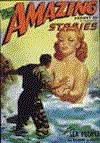|
|
|
Halloween is a time for stories, storytellers October 29, 1998 By Franklin Harris A friend asked, "Halloween is sort of like your Christmas, isn't it?" This week is, after all, the third in a row in which I've written about the holiday. Why write about Halloween in a column dedicated to movies and books and other entertainments? Simple answer: Halloween is the favorite holiday of storytellers. Follow the logic. Halloween is about tricks and treats, and a trick is a lie, and a lie is a story, and a good story is a treat. See? Most other holidays are not really the stuff of stories. Christmas is the exception with its tales of Santa, Rudolph, Frosty and the rest. But how many fables have been inspired by Valentine's Day? Halloween, however, drives entire genres of fiction. On Halloween, people watch horror movies. On Halloween, Anne Rice holds a party for fans of her novels of vampires and witches and living-dead mummies. On Halloween, otherwise sane people read aloud the poems of Edgar Allan Poe and try not to stumble over the poet's archaic verse. The truly ambitious try to read aloud the works of H.P. Lovecraft:
Ray Bradbury, one of America's most beloved fantasists, is Halloween's champion. In Bradbury's juvenile novel, "The Halloween Tree," the mysterious Mr. Moundshroud takes eight children on a trip through the history of Halloween. And, along the way, he teaches them something about life as well. In a chapter of Bradbury's "Martian Chronicles," a man fleeing Earth's prejudice and hate builds a second House of Usher on the surface of the Red Planet. And when the prejudiced and the haters follow him to Mars, they find themselves trapped in the house, unaware of its dangers, because they had already burned all of Poe's books. Before television -- not that there is anything wrong with television -- people told each other stories. Now, old-fashioned storytelling is dead. But, on Halloween, the dead rise, and people young and old gather around to hear the latest ghost story. It's better still if they can gather around a jack-o-lantern fire, beneath the stars, as the wind whistles through the clawed-hand branches of sleeping trees and rustles a carpet of brown, dead leaves. Atmosphere is half of what makes for a good ghost tale. Our earliest stories were fantasies. The oldest story we have, the tale of Gilgamesh and his quest for eternal life, is a fantasy. The oldest English-language story we have -- even if it is Old English -- is "Beowulf," which tells of a mighty warrior who slays dragons and man-eating monsters. Halloween is the one night of the year in which we take fantasy seriously. We dress up as witches and vampires and werewolves and other things that never existed -- except in the fertile minds of people long dead, who heard bumps in the night and decided that knowing something foul and deadly was behind the bumps was better than knowing nothing at all. On Halloween we reinvent ourselves. And every ghoul and every goblin we become -- every princess and every pirate -- has his own story. Everything about Halloween celebrates the imagination. And, as you might expect, storytellers appreciate, more than do most, everything about the imagination. It's that celebration of the imagination that motivates some of those who attack Halloween. When people imagine, they sometimes see the world differently -- and that always threatens the Powers That Be. The Establishment always has its own story and will tolerate no competition. It's no accident that artists have always been society's great subversives. And that's why storytellers love Halloween, and why Halloween belongs in a column about storytellers. |

RECENT COLUMNS
Order a helping of Cartoon Network's 'Robot Chicken'
03/31/05
Campaign against video games is political grandstanding
03/24/05
Prize-winning author is 'Wrong About Japan'
03/17/05
Censored book not a good start
03/10/05
Some superhero comics are for 'fanboys' only
03/03/05
'Constantine' does well with its out-of-place hero
02/24/05
'80s publisher First Comics' legacy still felt
02/17/05
Director's cut gives new 'Daredevil' DVD an edge
02/10/05
Put the fun back into 'funnybooks'
02/04/05
Is 'Elektra' the end of the road for Marvel movies?
01/27/05
'House of Flying Daggers' combines martial arts and heart
01/20/05
Anniversary edition of 'Flying Guillotine' has the chops
01/13/05
Movie books still have role in the Internet era
01/06/05
Looking ahead to the good and the bad for 2005
12/30/04
The best and worst of 2004
12/23/04
'Has-been' Shatner is a 'transformed man'
12/16/04
© Copyright 2005 PULP CULTURE PRODUCTIONS
Web site designed by Franklin Harris.
Send feedback to franklin@pulpculture.net.